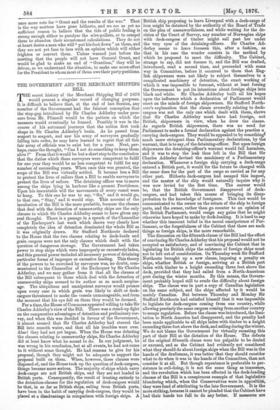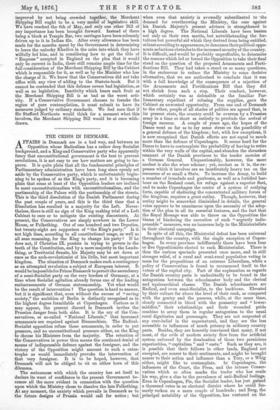THE GOVERNMENT AND THE MERCHANT SHIPPING BILL.
THE secret history of the Merchant Shipping Bill of 1876 would present a singular record of changing purposes. It is difficult to believe that, at the end of last Session, any member of the Government had the faintest conception that the stop-gap introduced by Sir Charles Adderley under pres- sure from Mr. Plimsoll would be the pattern on which the measure would eventually be framed. Possibly it was in the course of his autumnal journeys that the notion first took shape in Sir Charles Adderley's brain. As he passed from seaport to seaport, and saw his army of surveyors gradually falling into order, he may have learned to regret that all this fair array of officials was to exist but for a year. Next, per- haps, came the thought, " Can I not do something to keep them alive ?" From that it would be but a short step to the conclusion that the duties which these surveyors were competent to fulfil for one year they would be no less competent to fulfil for any number of succeeding years. When once this was granted, the scope of the Bill was virtually settled. It became less a Bill to protect the lives of sailors than a Bill to enable surveyors to protect the lives of sailors. The detaining officer was to move among the ships lying in harbour like a present Providence. Upon his inscrutable will the movements of every vessel were to hang. To this one he was to say, " Go," and it would go, to that one, " Stay," and it would stay. This account of the incubation of the Bill is the more probable, because the clauses that deal with the detention of unseaworthy ships are the only clauses to which Sir Charles Adderley seems to have given any real thought. There is a passage in a speech of the Chancellor of the Exchequer's last week which shows very clearly how completely the idea of detention dominated the whole Bill as it was originally drawn. Sir Stafford Northcote declared to the House that the two clauses relating to deck-loads and grain cargoes were not the only clauses which dealt with the question of dangerous stowage. The Government had taken power to stop ships which were improperly or excessivelyladen, and this general power included all necessary powers of detaining particular forms of improper or excessive loading. This theory of the powers to be exercised by surveyors was, no doubt, com- municated to the Chancellor of the Exchequer by Sir Charles Adderley, and we may gather from it that all the clauses of the Bill subsequent to those which deal with the detention of unseaworthy ships seemed to its author as so much surplus- age. The ubiquitous and omnipotent surveyor would pounce upon every case in which grain was likely to shift or deck- cargoes threatened to make the vessels unmanageable, and from the moment that his eye fell on them they would be doomed.
For a time, the House of Commons appeared willing to take Sir Charles Adderley's view of the Bill. There was a stand-up fight on the comparative advantages of detention and preliminary sur- vey, and when this was decided in favour of the Government, it almost seemed that Sir Charles Adderley had steered the Bill into smooth water, and that all his troubles were over. Alas { they had not yet begun. When the House was debating the clauses relating to unseaworthy ships, Sir Charles Adderley did at least know what he meant to do. In our judgment, he was wrong in his conclusion, but at all events, he had not come to it without some thought. He had reasons to give for his proposal, though they might not be adequate to support the proposal built on them. When, however, these clauses were disposed of, and the House took up the question of deck-cargoes, things became more serious. The majority of ships which carry deck-cargo are not British ships, and they are not loaded in British ports. Consequently, the result of trusting entirely to the detention-clauses for the regulation of deck-cargoes would be that, in so far as British ships, sailing from British ports, have been in the habit of carrying deck-cargoes, they would be placed at a disadvantage in comparison with foreign ships. A British ship proposing to leave Liverpool with a deck-cargo of iron might be detained by the authority of the Board of Trade
on the plea of unseaworthiness, and while waiting for the de- cision of the Court of Survey, any number of Norwegian ships with deck-cargoes of timber might sail past her under the very eyes of the detaining-officers. Sir Charles Ad-
derley seems to have foreseen this, after a fashion, so that in his case the wonder consists in the method by
which he proposed to meet the difficulty. The Cabinet, strange to say, did not foresee it, and the Bill was drafted, introduced, read a second time, and proceeded with some way in Committee, before it occurred to them that Eng- lish shipowners were not likely to subject themselves to a complicated machinery of detention, the exact working of which it was impossible to forecast, without at least forcing the Government to put its intentions about foreign ships into black and white. Sir Charles Adderley built all his hopes upon the influence which a declaration of Parliament would exert on the minds of foreign shipowners. Sir Stafford North- cote's explanation that the clause avowedly relating to deck- cargoes was not the only one which dealt with them, shows that Sir Charles Adderley must have had foreign, not British, shipowners in view, when he drew the clause. As regards British shipowners, there was no need for Parliament to make a formal declaration against the practice o carrying deck-cargoes. They would be appealed to by somethingf much more stringent than Parliamentary declarations, by the warrant, that is to say, of the detaining-officer. But upon foreign shipowners the detaining-officer's warrant would fall harmless, and it was to stop the leak thus left in the Bill that Sir Charles Adderley devised the machinery of a Parliamentary declaration. Whenever a foreign ship carrying a deck-cargo entered a British port, it would for the future be charged with
the same dues for the part of the cargo so carried as for any other part. Hitherto deck-cargoes had escaped this impost, and the master of the ship would naturally inquire why it was now levied for the first time. The answer would be, that the British Government disapproved of deck- cargoes, and had taken this means of bringing its disap- probation to the knowledge of foreigners. This fact would be communicated to the owner on the return of the ship to foreign parts, and the owner, rather than go counter to an opinion of the British Parliament, would resign any gains that he might otherwise have hoped to make by deck-loading. It is hard to say whether this innocent belief in the moral omnipotence of Par- liament, or the forgetfulness of the Cabinet that there are such things as foreign ships, is the more remarkable.
The discussion on the fifteenth clause of the Bill had the effect of convincing Sir Charles Adderley that his proposal would not be accepted as satisfactory, and of convincing the Cabinet that in legislating for British ships the existence of foreign ships must not be left out of consideration. On Thursday week Sir Stafford Northcote brought up a new clause, imposing a penalty on ships, whether British or foreign, arriving at a British port laden with timber to a height exceeding three feet above the deck, provided that they had sailed from a North-American port during the winter months. By this means, the Govern- ment probably hoped still to evade the difficulty about foreign ships. The clause was in part a copy of Canadian legislation on the same subject, and the ships affected by it would be mainly Canadian. But between Thursday and Monday Sir Stafford Northcote had satisfied himself that it was impossible to legislate for deck-cargoes coming from one country, while allowing precisely the same cargoes coming from another country to escape regulation. Before the clause was introduced, the limi- tation to North America had disappeared, and the penalty had been made applicable to all ships laden with timber to a height exceeding three feet above the deck, and sailing during the winter.
We do not blame the Government for virtually recasting this part of their Bill at the dictation of the House. The defects of the original fifteenth clause were too palpable to be denied or excused, and as the Cabinet had evidently not considered what they should do about foreign ships when the Bill was in the hands of the draftsman, it was better that they should consider what to do when it was in the hands of the Committee, than not consider it at all. But though repentance is preferable to per- sistence in evil-doing, it is not the same thing as innocence, and the revolution which has been effected in the deck-loading clauses of the Bill is a conspicuous example of that legislative blundering which, when the Conservatives were in opposition, they were fond of attributing to the late Government. It is the more striking, because it cannot be pleaded that the Cabinet have had their hands too full to do any better. If measures are improved by not being crowded together, the Merchant Shipping Bill ought to be a very model of legislative skill. We have reached the 6th of May, and only one other Bill of any importance has been brought forward. Instead of there being a block at Temple Bar, two carriages have been solemnly driven up to it in Indian file. After every allowance has been made for the months spent by the Government in determining to leave the unlucky Khedive in the mire into which they have wilfully led him, and in considering how to get the title of " Empress " accepted in England on the plea that it would only be current in India, there still remains ample time for the full consideration of the Merchant Shipping Bill by the Cabinet which is responsible for it, as well as by the Minister who has the charge of it. We know that the Conservatives did not take office with any view of adding to the Statute-book. But it cannot be contended that this defence covers bad legislation, as well as no legislation. Inactivity which bears such fruit as the Merchant Shipping Bill is as bad as the worst acti- vity. If a Conservative Government chooses to forsake the region of pure contemplation, it must submit to have its measures judged by ordinary standards. We feel sure that if Sir Stafford Northcote would think for a moment what this involves, the Merchant Shipping Bill would be at once with- drawn.



































 Previous page
Previous page